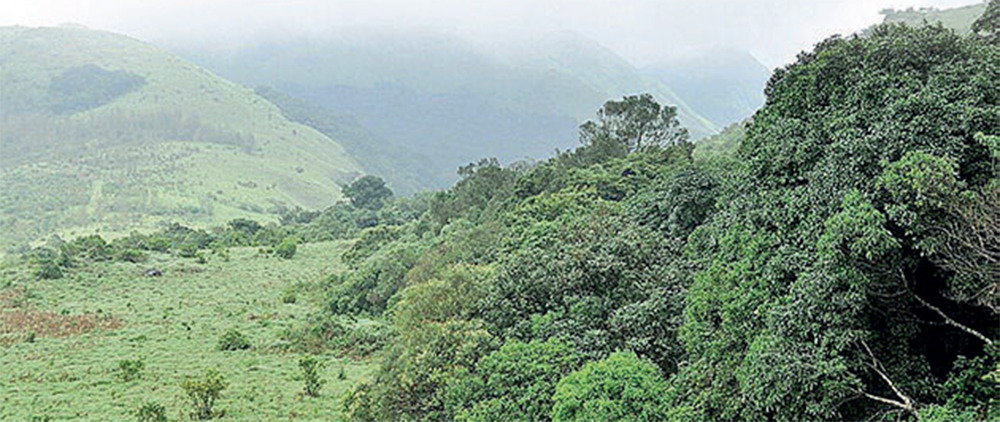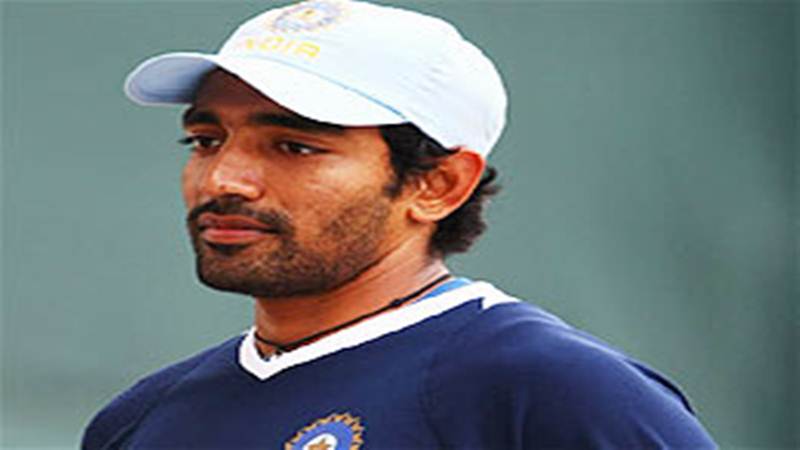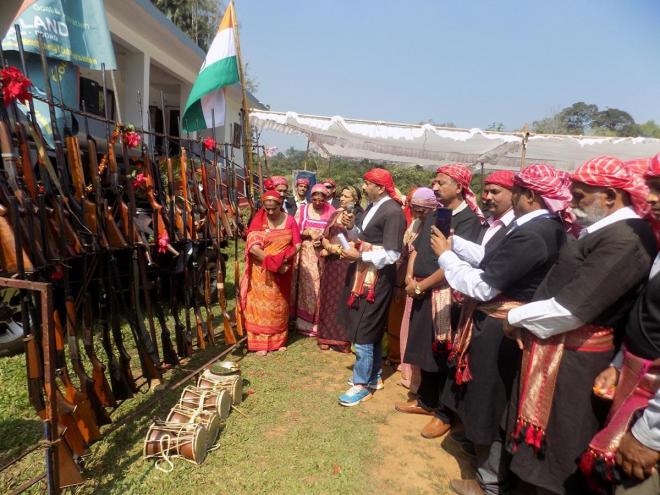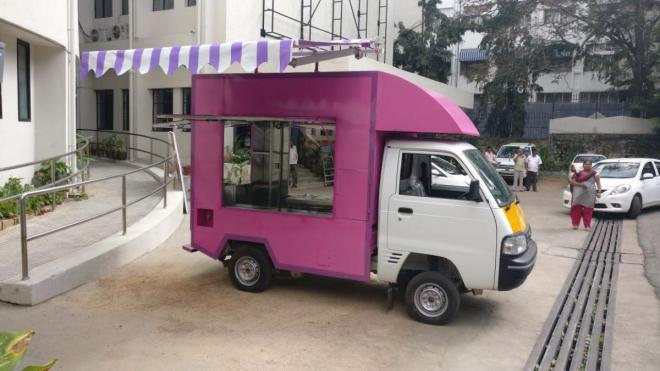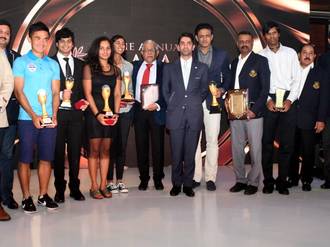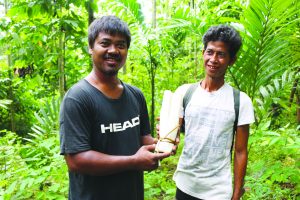
A “rich, strong, bitter, boiling hot, ruthless, depraved” cup of coffee is the “life blood of tired men” and most of us would agree to author Raymond Thornton Chandler on this.
In Meghalaya where tea is the traditional beverage, coffee has always remained a second fiddle to its more popular cousin. But things are changing fast and soon coffee will catch up with tea in popularity.
Though the practice of drinking coffee has seen an upward trend in the state in the last few years thanks to the booming cafe business, the beverage is not new to the hill tribes here.
“Coffee plant grows in the wild in Meghalaya and the fruits are eaten by birds. Some villagers would also drink coffee but they would prepare it indigenously,” says Dondor Giri Nongkhlaw, the owner of Smoky Falls Tribe Coffee, which is marketing the local brew.
Nongkhlaw is the first person to realise the potential of the local plantation and explore the villages for procuring beans. His quest for coffee grown in Meghalaya had its roots in his childhood memories of sipping a hot cuppa prepared by his grandmother by grinding the beans.
“I started intensive research on how to procure and market locally grown coffee after I retired in 2007. I have visited several villages and interacted with farmers and told them about the benefits of growing the cash crop,” says the former professor of Geography at Synod College. His roasting and grinding unit is the first in the entire northeastern region.
Smoky Falls is the result of Nongkhlaw’s untiring work and undaunted spirit. The 66-year-old man visits villages frequently and sensitise farmers on methods of plantation and soil replenishment. “Most of the villagers grow broomstick that affects the soil. This necessitates rejuvenation before going for coffee plantation,” he says.
Coffee, which is a labour intensive but high-return crop, was reportedly introduced in Cachar district in Assam during 1850s. It was also cultivated in Mizoram and Cherrapunjee in 1870s. Hundred tonnes of coffee were marketed in Shillong in the late 19th and early 20th centuries. But after 1930, the cultivation lost steam.
Arabica is the only variety that grew in the wilds of Meghalaya, according to a book written in 1906 by BC Basu, the then director of the Agriculture Department of undivided Assam. It was the Coffee Board of India that introduced Robusta in the state and trained farmers in planting the variety, says Nongkhlaw. There are indigenous varieties of coffee too like Coffea khasiana and Coffea bengalensis, which are common in the hills.
New avenues
The Coffee Board has taken up a large project to encourage new coffee plantation by raising group nursery with financial assistance from the board. It spent 10-15 years on survey and identification of suitable area. It was found that 44,000 hectare, including 5,900 hectare in Meghalaya, is suitable for coffee in the entire North East. Out of this, 3,350 hectare is suitable in Garo Hills and 2,545 hectare in East Khasi Hills.
In 2016-17, 1,90,000 coffee seedlings were raised in Ri Bhoi and Jaintia Hills. At present, Robusta and Arabica plantations cover an area of 1,005 hectares in Meghalaya. The production in the last five years varied between 25-30 metric tonne.
Arabica plant yields berries after the third year and Robusta after four. Nongkhlaw says sometimes the plants may bear fruits early but the quality will not be good.
While Robusta grows in low altitude areas, between 500 and 1,000 meters, Arabica is found in areas 3000 ft or more above the sea level. In East Khasi Hills, coffee plantation is found at Nongjri, Lapalang, Mawryngkang, Nongskhen, Myllat and Mynria. Marngar and Nongrim Jyrmi in Ri Bhoi also have the plantation. Four districts in Garo Hills too produce a substantial amount of coffee. The crop grown in the state is organic.
“Coffee is a cash crop and is also a perennial crop that can protect the environment. It is also giving income to the local population both directly and indirectly. The Soil Department here was helping the coffee farmers by providing technical guidance,” says a senior official of Coffee Board in Guwahati.
Now, the Meghalaya Basin Development Authority is also involved and recently two technical workshops were conducted in Tura and Shillong.
At present, around 1,700 farmers in the state are involved in coffee cultivation. The Coffee Board has a senior liaison officer in Tura and a junior liaison officer in Shillong. “The commercial crops board of the Soil Conservation Department was promoting coffee, especially in Garo Hills. But many farmers had left it due to lack of buyers until Smoky Falls came along. The Coffee Board has also been doing some work here,” said a senior official in the Agriculture Department.
Agents of change
Another agent of change, besides Smoky Falls and the various government units, is Zizira, a local food product’s venture. Zizira has explored the remotest corners of the state to find the best beans.
The young explorers at Zizira say though Meghalaya produces high quality coffee it does not count in the national market. This is because the number of farmers is less and those who grew coffee never sold the produce locally. “In fact, their harvest is purchased by the Coffee Board and sent to the nearest processing centre in Guwahati and then transported to Bengaluru’s auction houses. The identity of Meghalaya coffee is thus lost,” the team points out.
To empower the farmers here and give the indigenous crop its identity, the Zizira team has been exploring the back of beyond for the last two years. Zizira may source coffee directly from such farmers for both in-house consumption and creating its own product.
Talking about their unique experiences with coffee farmers, a member of the team narrates the story of Teibor Mynsong of Ri Bhoi district.
“Mynsong used to grow pineapples but shifted to coffee in 2012 because it requires less labour and care. The leaves fall off the plants and replenish the soil and no pesticide or fertiliser is required. He now has 1,200 coffee plants which produce 2 kg of coffee berries per year,” she says.
Nongkhlaw, who is planning to introduce green coffee soon, says while Robusta is a sturdy variety, Arabica needs care against stem borers and leaf rust.
Villagers at Nongjri in Sohra are also realising the benefits. About 20 farmers in the village near Bangladesh border have taken up coffee plantation. Along the serpentine road that leads to Nongjri Tluh from Pynursla, one would find rows of broom shrubs and bamboos and amid the bushes one can also spot a few coffee plants growing wildly.
Coffee farmers Riing Wallang and Bison Roy Laso of Nongjri Tluh love to take visitors around their coffee plantation. Though the produce is good, “we are expecting less beans this year because of the torrential rain”, says the duo in unison.
“I have planted 1,000 more. It is true that coffee does not require much care but the price that we get is low and this makes things unsustainable. If we get a higher price, we can do better,” says 65-year-old Wallang while running up the slope to his coffee bagan (garden).
The farmers sell coffee fruits at Rs 60-70 per kg, informs Laso.
Besides coffee, they also grow broom, betel nut and papaya, among other things.
Back in Shillong, Nongkhlaw too points out the drawbacks.
Erratic power supply, says the owner of Smoky Falls, hampers roasting. “If power goes off in between roasting, then the entire 5 kg of coffee beans is wasted (the roasting machine can take in 5kg at a time),” he says.
Also, high price of locally grown coffee deters many from buying the product. “The high price is because we do not add chicory to the product unlike the instant coffee you get in the market. Also, a kilogram of coffee fruits would yield only around 350 gm of beans after removing the husk. So you can imagine,” says Nongkhlaw whose Smoky Falls brand is supplied to cities like Mumbai and Chennai but the sale is only online.
The organic status, says Nongkhlaw, might improve the scenario. But the Coffee Board official says it will take some time before proper certification.
Zizira says proper processing units are important. “A government official rightly pointed out to our team that even if a good number of people take up coffee growing, lack of knowledge and the required processing units are pushing these farmers to give up cultivation,” the team points out.
Future brew
The government recently proposed to export coffee to Bangladesh but Nongkhlaw says for this, there should be sustainability. The Coffee Board official says it may take three to four years to increase the production before the state thinks about exporting.
“There has been some talk of exploring the market. Whether the idea is practical will depend on the market and consumer preferences there but a possible hurdle might arise from the HS codes of Bangladesh,” says the official in the Agriculture Department.
But VR Gudde Gowda, joint director extension at Coffee Board Guwahati, is optimistic.
“Due to the coffee culture coming up in India, the North East youths are also attracted towards it. Nongkhlaw has set up a roasting and grinding unit in Shillong. He is buying the coffee directly from growers and thereby attracting more farmers to grow coffee,” says Gowda.
(Photo courtesy: Zizira, Sunday Shillong)
source: http://www.theshillongtimes.com / The Shillong Times / Home> Sunday / by Webeditor / Heather Cecilia Phanwar & Nabamita Mitra

